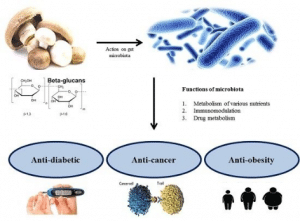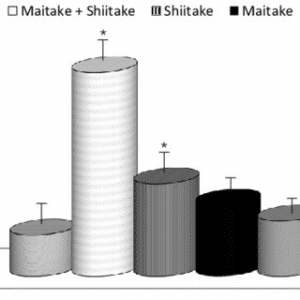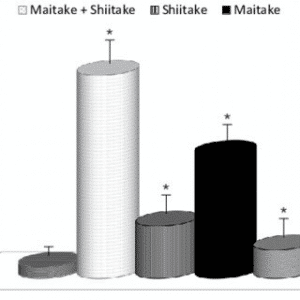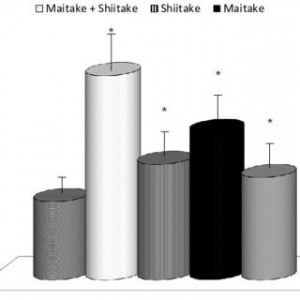Introduction and brief notes on Maitake
The Maitake, whose botanical name is Grifola frondosa, it is a mushroom basidiomycete che cresce principalmente in Giappone, dove è utilizzato da millenni ed è considerato uno dei migliori funghi medicinali. IS presente anche nelle foreste asiatiche sempreverdi con umidità media e pochi sbalzi di temperatura stagionali.
It also grows in the West, both in Europe and in North America, particularly in the border areas with Canada.
The Japanese name Maitake it is very picturesque and is given by the crasis between the words "Mai" and "Take", whose translation for us Westerners sounds like "dancing mushroom".
Perché il Maitake è considerato così importante tra i medicinal mushrooms dai giapponesi e il resto del mondo?
For a first and general understanding of the reasons it would be enough to take a look at its composition, which has attracted the attention of many scholars.
Infatti, i suoi benefici sulla salute dell’organismo sono evidenziati in molti studi scientifici, che verranno citati nel corso dell’articolo.
Funzioni del fungo Maitake
The Maitake serve:
- a sostenere e modulare positivamente il immune system (immunomodulatory action);
- to favor the lowering of cholesterol level (hypocholesterolemic action);
- to favor the lowering of livello glicemico (hypoglycemic action) / action of fight against diabetes;
- to facilitate prevention and the contrast of tumors;
- action to counteract theobesity.
Fig. 11 - A graphic representation of the main benefits brought about by taking Maitake.
Hypocholesterolemic action:
The Maitake favorisce l’abbassamento del livello di colesterolo e agisce sul cosiddetto bad cholesterol, tecnicamente chiamato LDL, che provoca le placche arteriosclerotiche.
Rich in beta-glucans, the Maitake for this reason it can be considered a great natural aid in the prevention of cardiovascular diseases.
Oltre che nel Maitake, beta glucans are also found in Cordyceps sinensis, in Reishi, and in the Shiitake.
What does the Maitake cure?
The Maitake contribuisce ad alleviare alcuni effetti collaterali e indesiderati indotti dalla chemioterapia, oltre a espletare una vera e propria azione di prevenzione e contrasto dei tumori.
Esso, infatti, si è rivelato utile nella protezione delle cellule dalle neoplasie, oltre che nel rallentamento, o quantomeno inibizione, della crescita di un eventuale tumore.
Maitake is useful for lowering blood sugar levels. This is due to the fact that it inhibits a particular enzyme called alpha-glucosidase, which promotes the absorption of sugars.
Così facendo, il Maitake è in grado di contrastare l’azione dell’alfa-glucosidasi e quindi di contrastare l’assorbimento degli zuccheri.
Tra l’altro, l’assunzione in contemporanea di due funghi migliora l’inibizione proprio dell’enzima alfa-glucosidasi. E i due funghi in questione sono il Maitake and the Cordyceps sinensis.
Ovviamente, la riduzione del livello glicemico esplica anche una preziosa anti-diabetes action.
Regular intake of Maitake improves insulin sensitivity, favorendo lo spostamento del profilo ormonale da insulino-resistente a insulino-sensibile.
Detto in altre parole, in giovane età sono tutti (o quasi) insulino-sensibili, ma col passare del tempo si tende a divenire insulino-resistenti, ovvero, le cellule tendono a sviluppare una certa resistenza all’azione dell’insulina, che in ultima analisi significa che invecchiando tendiamo ad ingrassare più facilmente.
Well, the Maitake it favors insulin sensitivity, which is one of the "metabolic privileges" of youth.
Taking Maitake daily reduces LDL cholesterol, that is, what is commonly referred to as bad cholesterol. And it does so quickly.
L'taking Maitake contribuisce al rafforzamento del nostro sistema immunitario, ma a tal proposito è necessario fare una precisazione:
To enjoy even greater support from the immune system, it is recommended to consume Maitake is Shiitake.
Fig. 12 - Immunostimulating effects of Maitake, of the Shiitake, he was born in Maitake is Shiitake together.
Ovviamente, la capacità di sostegno al sistema immunitario varia a seconda del frangente.
But as the graphs show, the simultaneous assumption of Maitake is Shiitake has a more powerful action than taking a single mushroom.
When to take Maitake?
The Maitake it can be taken both just before and during main meals. It is recommended to take the recommended dosage divided into 2 or 3 doses over a 24 hour period.
After all that has been said so far regarding the Maitake mushroom, one might think that its intake is recommended only in certain cases. Well, surely there are circumstances in which taking it is more recommended than others.
Ma va fatta un’importante considerazione: il metabolismo, concettualmente parlando, è un mosaico, dove ogni tessera è rappresentata dalle abitudini alimentari e motorie, per ogni giorno della propria vita. Insomma, ogni tessera è il “riassunto metabolico” di una giornata.
Va da sé che introdurre preziosi principi bioattivi è un bene per la salute, indipendentemente che si sia affetti da alcuni disturbi o meno.
Inoltre, il Maitake it has an important supportive action on our immune system, which never hurts.
Where can you buy Maitake?
A good supplement based on Maitake si può acquistare da un produttore serio ed affidabile. In quell’ integratore si trovano tutti i principi bioattivi tanto preziosi per la salute.
Ci sono aziende d’élite che producono integratori di primissima qualità. Queste aziende sono dotate della GMP, the Good Manufacturing Practices, complete with Patent Number issued by the certifying body. Buying from a manufacturer that owns GMP is a guarantee of excellent product quality.
Where to buy Maitake mushrooms?
If we wanted to buy the real mushroom, we should go to a grocery store and, of course, we should have the skills to choose and cook it.
If we do not have these skills or do not have a lot of time, the practical and quick use of a good supplement allows us to enjoy all the benefits data from Maitake.
It should be noted that mushroom extracts are used in the studies, not the mushroom itself.
Note: Quando scrivo gli articoli sono solito consultare, per ovvi motivi lavorativi, NCBI (National Center for Biotechnology Information) e PMC (Pubmed Central).
For the drafting of this article I have consulted the following studies on the Maitake:
Bioactive ingredients and medicinal values of Maitake.
Maitake extracts and their therapeutic potential.
Maitake mushroom: Systematic review by natural standard research collaboration.
Immune enhancing effects of Maitake and Shiitake extracts.
Anti diabetic activity present in the fruit body of Maitake.





